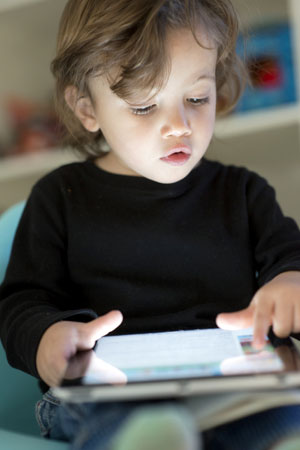
Photo by Peter M. Fisher/Thinkstock Getty Images for SLJ.
As younger and younger children recognize and use electronic devices as sources of information and entertainment, what is the impact on their literacy skills? Largely a positive one, according to a study printed in the January 2014 edition of the peer-reviewed journal SAGE Open. The report examines how different digital tools—an iPad, an iPod, and a tabletop touchscreen computer—capture and hold children’s attention to print media delivered electronically.
In the study—Young Children’s Engagement With E-Books at School: Does Device Matter?, by Kathleen Roskos, Yi Shang, and Emily Gray of John Carroll University and Karen Burstein of the Southwest Institute for Families and Children—the authors speculate that the “spatial and temporal synchrony” of children looking, listening, and touching while reading may be the “sweet spot” that garners their “attention to e-text in ways that support early literacy experience and learning.”
The study, which examines the use of ebooks as a curricular resource in preschool literary and language learning, uses as its sample two dozen Head Start-enrolled 4-year-olds participating in eight different Early Reading First classrooms, four in the Midwest and four in the Southwest United States. The sample is 17 percent Hispanic, 33 percent white, and 50 percent African American, and includes a majority of boys. The mean age of participant children is 54 months.
According to the authors, the audio features of all three types of devices utilized in their survey support listening “relatively evenly, which has implications for instruction in oral language comprehension for literacy, suggesting that tried and true techniques may apply to ebook pedagogy.”
However, the amount of time children spend on touching screen while reading bears further examination, the authors say, and the choice of device utilized during those experiences has a moderate impact on several key multi-sensory behaviors—such as moving and gesturing—that preschool children, whose motor skills are developing, use to engage with ebook content.
For example, “the larger desktop touch screen, it appears, supports different modalities than the smallest device, the iPod, while the iPad and iPod (mobiles) support comparable behaviors,” the authors find. Thus, larger touch screens may require instructional accommodation by the teacher, while mobile devices allow children the opportunity to freely move and shift position as they read.
The full text of the study, which is part of a series, can be viewed online.


